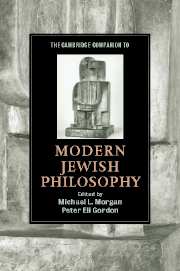Book contents
- Frontmatter
- 1 Introduction: Modern Jewish Philosophy, Modern Philosophy, and Modern Judaism
- 2 Baruch Spinoza and the Naturalization of Judaism
- 3 The Liberalism of Moses Mendelssohn
- 4 Jewish Philosophy after Kant The Legacy of Salomon Maimon
- 5 Hermann Cohen: Judaism and Critical Idealism
- 6 Self, Other, Text, God: The Dialogical Thought of Martin Buber
- 7 Franz Rosenzweig and the Philosophy of Jewish Existence
- 8 Leo Strauss and Modern Jewish Thought
- 9 Messianism and Modern Jewish Philosophy
- 10 Ethics, Authority, and Autonomy
- 11 Joseph Soloveitchik and Halakhic Man
- 12 Emmanuel Levinas: Judaism and the Primacy of the Ethical
- 13 Emil Fackenheim, the Holocaust, and Philosophy
- 14 Evil, Suffering, and the Holocaust
- 15 Revelation, Language, and Commentary: From Buber to Derrida
- 16 Feminism and Modern Jewish Philosophy
- Bibliography
- Index
5 - Hermann Cohen: Judaism and Critical Idealism
Published online by Cambridge University Press: 28 September 2007
- Frontmatter
- 1 Introduction: Modern Jewish Philosophy, Modern Philosophy, and Modern Judaism
- 2 Baruch Spinoza and the Naturalization of Judaism
- 3 The Liberalism of Moses Mendelssohn
- 4 Jewish Philosophy after Kant The Legacy of Salomon Maimon
- 5 Hermann Cohen: Judaism and Critical Idealism
- 6 Self, Other, Text, God: The Dialogical Thought of Martin Buber
- 7 Franz Rosenzweig and the Philosophy of Jewish Existence
- 8 Leo Strauss and Modern Jewish Thought
- 9 Messianism and Modern Jewish Philosophy
- 10 Ethics, Authority, and Autonomy
- 11 Joseph Soloveitchik and Halakhic Man
- 12 Emmanuel Levinas: Judaism and the Primacy of the Ethical
- 13 Emil Fackenheim, the Holocaust, and Philosophy
- 14 Evil, Suffering, and the Holocaust
- 15 Revelation, Language, and Commentary: From Buber to Derrida
- 16 Feminism and Modern Jewish Philosophy
- Bibliography
- Index
Summary
[Translated by John Denton]
Was Hermann Cohen a Jewish thinker or a German philosopher? Did he belong chiefly to the tradition of Jewish philosophy or instead to the classical tradition of critical idealism, of which Kant is the paradigmatic figure and fundamental reference point? Contemporary opinion of Cohen was marked by controversy. In Jewish circles, although he was respected and acknowledged as an authoritative voice, he was also criticized and accused of denying his Jewish identity. Meanwhile, his philosophical works, notwithstanding respectful attentions, were not always successful in the academic world, where he more than once encountered problems because of his Jewish origins. In this chapter, I shall address the question of Cohen’s status as a Jewish philosopher chiefly by examining Cohen’s occasional texts on Jewish topics and contemporary controversies that affected the Jewish community in his day.
COHEN’s LIFE: A BRIEF SKETCH
Hermann Cohen was born in Coswig (Anhalt) on 4 July 1842, the son of Gerson Cohen and Friederike Salomon. At the age of eleven, he was sent to the grammar school in Dessau. At the age of fifteen, though still enrolled in the grammar school as an external student, Hermann entered the theological seminary in Breslau, where he commenced his rabbinical training. As soon as he had received his school certificate, he also left the seminary, as he was now drawn to philosophy and philology. In 1861, he enrolled in the University of Breslau, and in 1864, he moved to Berlin to study at the University there.
- Type
- Chapter
- Information
- The Cambridge Companion to Modern Jewish Philosophy , pp. 80 - 101Publisher: Cambridge University PressPrint publication year: 2007
- 4
- Cited by

